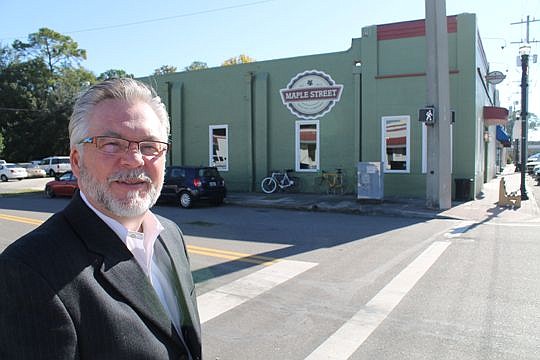
Chelsea Harrelson hadn’t worked at Maple Street Biscuit Co. very long when she got in trouble.
Her boss, Scott Moore, told her to step outside so they could talk.
“I had holes in my shoes,” Harrelson said. “I was really scared because I thought I was going to lose my job.”
Moore walked her up the street to a place that was selling shoes. He took Harrelson inside and bought her a pair. That’s when Harrelson knew she worked in an amazing place.
Almost two years later, Moore partnered with Harrelson to open the fourth Maple Street Biscuit in Murray Hill. A career restaurant worker, it had been Harrelson’s dream to have her own store.
“I’ve been given a great opportunity, but that opportunity is not why I stayed,” Harrelson said. “It’s because of what I’ve learned by being a part of this.”
If restaurants today are “destinations” designed to give customers “an experience,” then Maple Street Biscuit delivers the experience of getting back to being a community.
The restaurant that serves “Southern comfort food with a modern twist” has four locations and is on track to open three more.
For all of the stores, Moore partnered with someone who needed an opportunity — a church member, a good employee, a friend.
“I know people sometimes start restaurants with the idea of, ‘We’ll go out and franchise it, or go public.’ That really has not been part of the plan,” he said.
Moore’s growth strategy is simpler, less business mogul and more Stephen Covey.
It’s help people, serve others, be part of the community.
For Maple Street Biscuit’s customers, this is how it works:
There are no hidden agendas or gimmicks. Meals are priced at $5, $6 and $7, instead of $5.25 or $5.95. There are no add-on charges, no tips and customers are invited to bus their own tables.
A row of coffee cups lines the counter wall, so people can help themselves to a cup and pay later, via an honor system.
“One guy at the beach couldn’t believe it,” Moore said. “He sat for an hour and a half one Saturday, watching to see if anyone would steal a cup.”
Also, Moore picks locations with an eye toward urban revitalization — dark corners, with buildings that have been empty for a year or two. They’re typically a good fit for the company’s brand of building a community space with a retro-industrial feel.
Moore didn’t expect to expand Maple Street Biscuit after the first store. When others approached him about it, he offered them partnerships.
“I talked with them about a franchise model, and they were much more interested in somebody being there with them,” Moore said. “(They) didn’t have the money you need to buy a franchise. Not in the next 10 years would they have that kind of money.”
Moore opened the first Maple Street Biscuit in San Marco two years ago with partner Gus Evans. A year before that Moore, a 20-year grocery business veteran, had been vice president of training and operations at Winn-Dixie. Then Bi-Lo bought the company.
Bi-Lo offered him another job at the same pay, but he would have had to go from managing a team of 170 people across 11 states to just five people.
“I had to decide whether I wanted to just coast into glory or do something that would have more of an impact on people’s lives,” he said.
Moore took a leap of faith and left.
He got the idea for a biscuit company from a restaurant in Portland, Ore., but updated the brand from traditional ingredients to some unusual ones — goat cheese, pepper jelly and pecan wood-smoked bacon. That’s the “modern twist.”
The menu looks like 20 different ways to make a sandwich from fried chicken, but the recipes don’t disappoint. They include flaky but firm biscuits, wood-smoked bacon, maple syrup and some very peppery sausage gravy.
The recipes also were born of a community effort.
Moore and his founding team invited church members to weekly taste tests for five months. Ever the business analyst, Moore had everyone rate the recipes on spreadsheets. The crowd-sourcing worked.
“None of us even had a culinary background,” Moore said.
(904) 356-2466